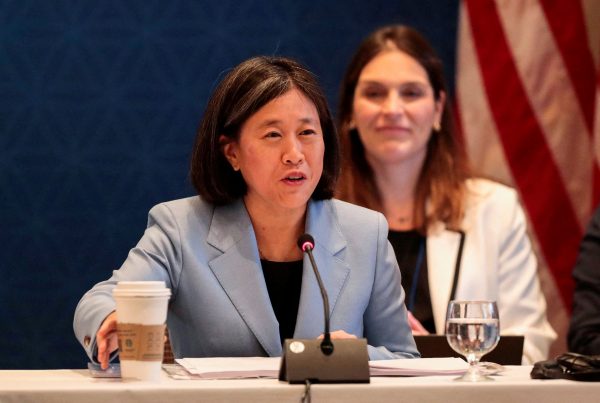The security exception, Article XXI, was included in the General Agreement on Tariffs and Trade (GATT) to allow for otherwise illegal measures taken purely for security reasons. The Obama, Trump and Biden administrations have all made clear that the US position is that a country’s use of Article XXI cannot be challenged in the WTO. Russia supports the US view, but China, the European Union and South Korea are among those who argue that the WTO has a right to investigate whether a country has made a plausible link between its use of Article XXI and an actual security interest.
The specific wording of Article XXI implies that there are standards to judge whether it has been used appropriately. It states that countries can take any action necessary for the protection of ‘essential security interests’, which among other things, includes actions taken during a time of war or emergency in international relations. If the protection of security interests had been intended to be a blanket exception, it would have been worded more simply.
As the GATT and WTO members understood that a snowballing use of Article XXI would endanger the world trading system, for 70 years they exercised self-restraint. The United States only invoked Article XXI to embargo Cuba in 1961 and Nicaragua in 1985, and the European Union used it to restrict imports from Argentina in 1982 and Yugoslavia in 1992.
Article XXI only surfaced again in 2014, when Russia invoked Article XXI(b)(iii) as taken in time of war or other emergency in international relations after its invasion of Crimea to justify its ban on the transit of goods from Ukraine destined for Kazakhstan and Kyrgyzstan through Russia.
In 2018, the Trump administration invoked Article XXI(b)(ii) — which allows states to protect access to their materials by restricting ‘the traffic in arms, ammunition and implements of war […] carried on directly or indirectly for the purpose of supplying a military establishment’ — to impose import restrictions on steel and aluminium. This was pure protectionism, as only a small portion of domestically produced or imported steel or aluminium is used for military purposes.
We may never learn how the Appellate Body would interpret US and Russian use of Article XXI, because since 11 December 2019, the United States government has blocked all appointments to the Appellate Body. The Appellate Body has not had enough members to hear a case for almost five years.
As international trade is increasingly entwined with the concept of economic security, allowing the security exception to be self-judging could be devastating to global trade. As the United States is almost certainly not going to change its opinion on the justiciability of Article XXI, one crude workaround might be for countries to retaliate by invoking their own self-judging right to resort to Article XXI. But it is easy to imagine that becoming a downward spiral toward protectionism under the guise of security.
China tried a different approach. In 2023, China imposed duties on several US products to offset US restrictions on trade in steel and aluminium. China did not invoke Article XXI but instead argued that the US had enacted a de facto safeguard measure cloaked as a security exception, which permitted China to right the balance by using Article XIX, regarding ‘safeguards’.
Another solution might be for the WTO to clarify its rules to make them conform with US and Russian opinion that the security exception is self-judging, while at the same time implementing new or existing processes to allow for counterbalancing measures. But this would concede that use of national security exceptions is beyond the WTO’s purview, despite the plain wording of Article XXI.
A more palatable approach might be for the United States, the European Union, South Korea, Japan and Australia to meet outside of the WTO to agree on trade rules, including the use of Article XXI. The United States would be unlikely to agree to any mechanism that could rule against security exceptions, but it might agree to an arbitration system to rebalance trade among economic allies. Short of that, even a requirement to explain and consult among like-minded countries might impose some brake on the abuse of the security exception, which would also benefit the wider trading community.
Maybe in the international environment of 2023, this is too arcane to matter. Rules and norms are in tatters everywhere. But the uses of Article XXI in recent years at least makes clear that the world is not neatly divided into countries that respect the rule of law and those that do not. The United States should acknowledge with humility that its abandonment of self-restraint in its use of GATT Article XXI and its sabotage of the WTO dispute settlement mechanism show that, barring a solution to the Article XXI problem, even its commitment to an international rules-based order has limits.
Mark Tokola is Vice President of the Korea Economic Institute of America in Washington, DC.

